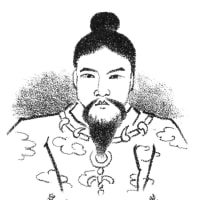『日本書紀』孝徳天皇 13
三月癸亥朔甲子、詔東國々司等曰。集侍群卿大夫及臣連國造伴造幷諸百姓等、咸可聽之。夫君於天地之間而宰萬民者、不可獨制、要須臣翼。由是、代々之我皇祖等、共卿祖考倶治。朕復思欲蒙神護力、共卿等治。故、前以良家大夫使治東方八道。既而國司之任、六人奉法二人違令、毀譽各聞。朕便美厥奉法、疾斯違令。凡將治者若君如臣、先當正己而後正他。如不自正、何能正人。是以、不自正者、不擇君臣、乃可受殃。豈不愼矣。汝率而正、孰敢不正。今隨前勅而處斷之。
≪英訳≫
On the second day of the third month, an imperial edict was issued to the provincial governors (国司, kuni no tsukasa) of the eastern provinces:
“Let all those gathered here—nobles and senior officials (群卿大夫, maetsukimi-tachi), ministers (臣, omi), chieftains (連, muraji), regional rulers (国造, kuni no miyatsuko), and administrators (伴造, tomo no miyatsuko), together with all the common people (百姓, ōmitakara)—listen well.
To rule over the myriad people between Heaven and Earth as a sovereign (君, kimi) cannot be done by one alone; it is essential to have the assistance of ministers (臣, omi). Thus, throughout the generations, our imperial ancestors (皇祖, sumemioya) governed in cooperation with the ancestors of you who now stand before me.
I, too, wish to govern together with you, under the protection and divine favor of the gods.
Previously, I dispatched able men from good families to serve as provincial governors (国司, kuni no tsukasa) in the eight circuits of the eastern provinces (東方八道, tōhō hachidō). Among them, six faithfully followed the law, while two disobeyed it. Rumors, both critical and praiseworthy, have reached my ears.
I commend those who upheld the law and deeply regret the actions of those who defied it.
Whether one rules as sovereign or serves as a minister, any who seek to govern must first correct themselves before correcting others. If one cannot govern oneself, how can one govern others?
Therefore, those who fail to correct themselves, regardless of their position as sovereign or minister, shall surely bring misfortune upon themselves. Is this not a matter requiring great caution?
If you conduct yourselves rightly, who will dare to act unjustly?
Now, in accordance with the previous imperial decree (勅, mikotonori), I shall make judgment on this matter.”
≪この英文の和訳≫
三月二日、東国の国司(くにのつかさ)たちに対し、天皇は詔(みことのり)を下された。
「ここに集った群卿大夫(まえつきみ)・臣(おみ)・連(むらじ)・国造(くにのみやつこ)・伴造(とものみやつこ)、およびすべての百姓(民 おおみたから)たちよ、よく聞くがよい。
天地のあいだにあって君(きみ)として万民を治めることは、一人の力で成しうるものではない。必ずや臣下の補佐が必要である。ゆえに、代々の皇祖(すめみおや)の御代においても、そなたたちの祖先と力を合わせて国を治めてこられたのである。
朕(私)もまた、神々のご加護をいただきながら、そなたたちと共に国を治めてゆきたいと考えておる。
先に、良家(家柄、身分の良い家)の大夫(たいふ)を選び、東方八道に国司として遣わした。そのうち六人は法を守ったが、二人はこれに背いた。称賛する者もあれば、誹(そし)る者もあり、その噂は朕の耳にも届いている。
法を守った者は称え、法に背いた者は誠に遺憾である。
君として、また臣として、人を治めようと望むならば、まず自らを正すべきであり、それを成してはじめて他者を正すことができる。自らを正すことができずして、どうして他人を正せようか。
ゆえに、自らを正すことができぬ者は、君臣の別なく、必ず災いを招くことになる。慎まなければならぬ。
そなたたちが正しければ、誰があえて不正を働こうか。
今、先に下した勅(みことのり)に従い、この件について裁きを下すこととする」
令和7年4月14日(月) 2025














